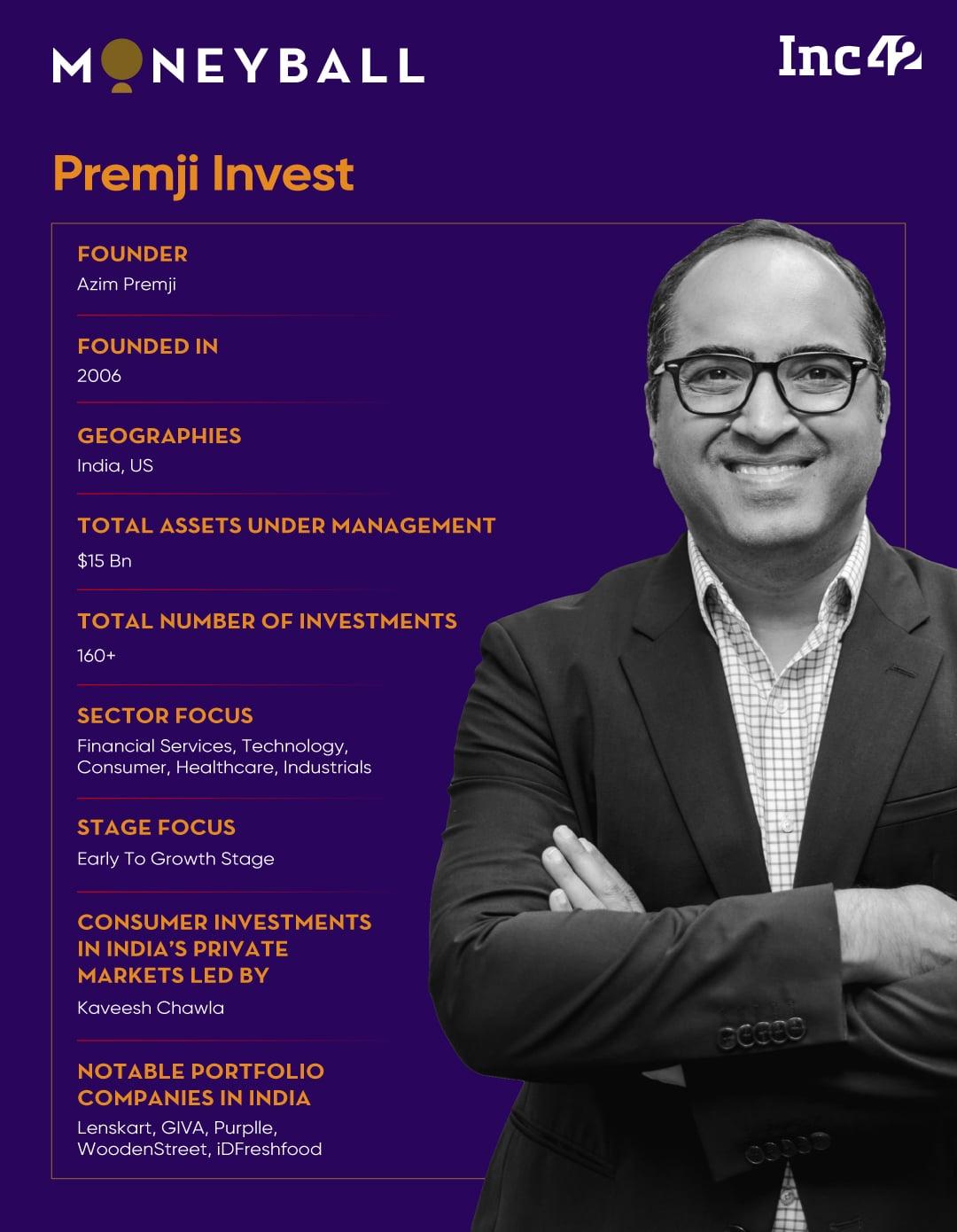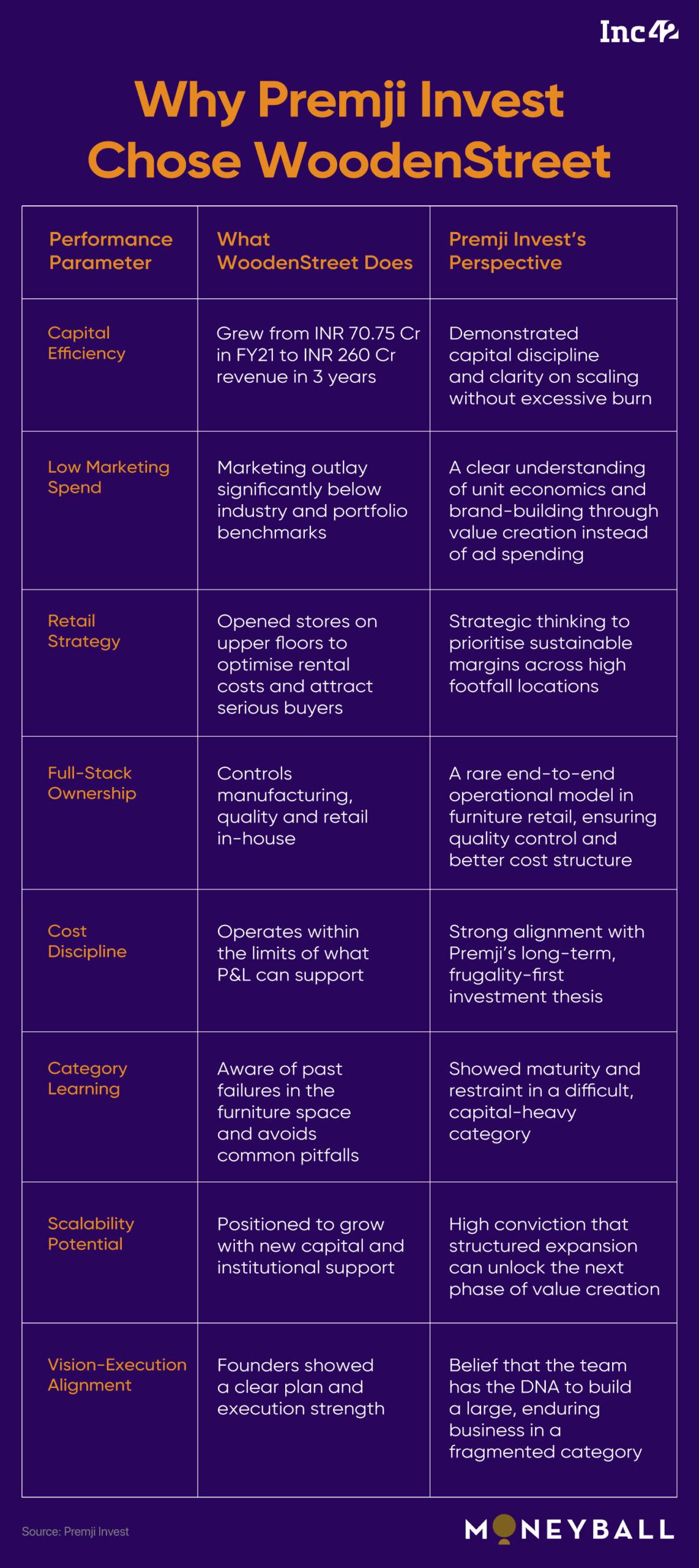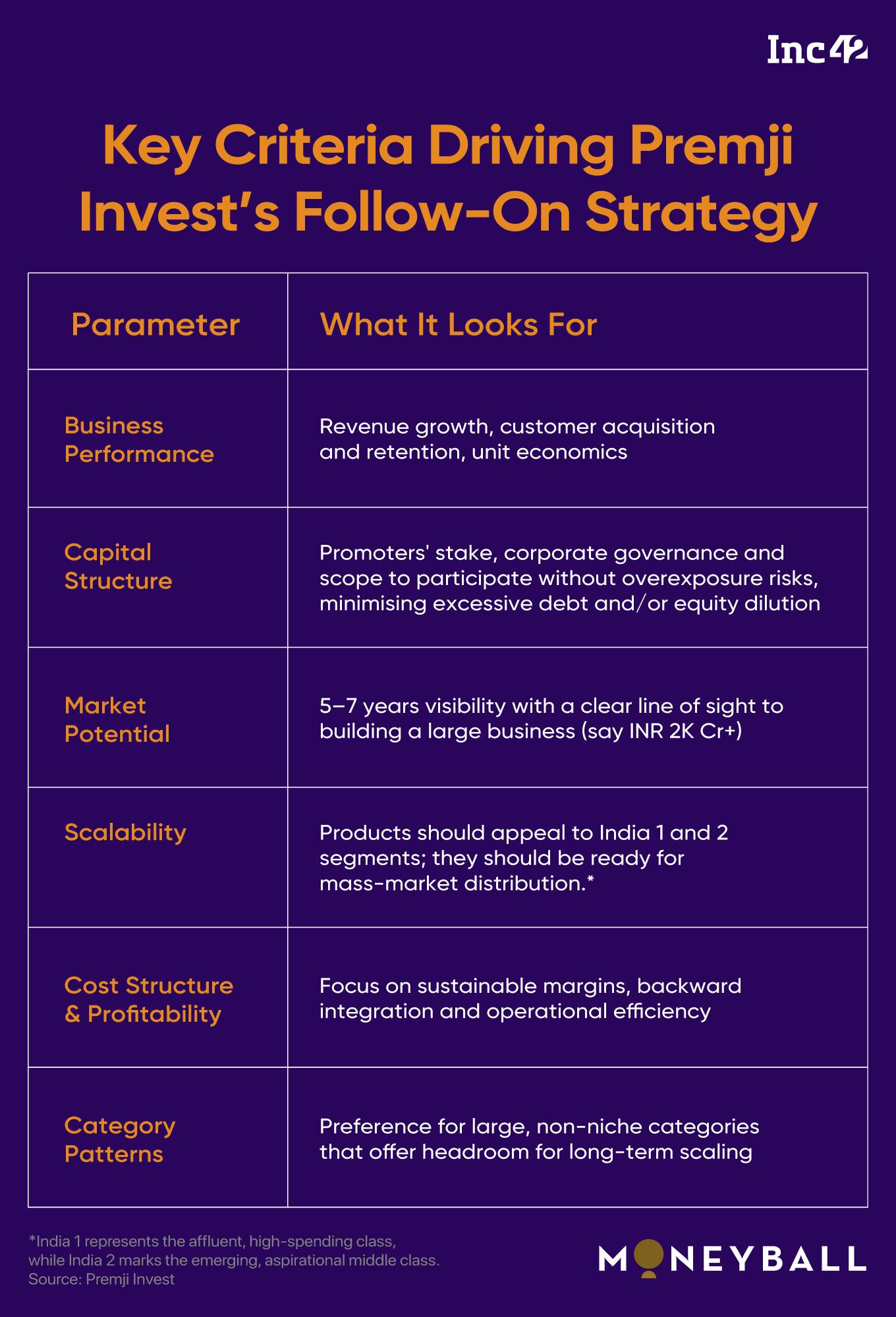In December 2024, Jaipur-based direct-to-consumer (D2C) furniture brand WoodenStreet secured INR 354 Cr (about $43 Mn) in Series C, one of the largest investment rounds in India’s home and furniture sector in recent years. Premji Invest, the family office of Wipro founder Azim Premji, led that round.
“It was late 2023 when we discovered them [WoodenStreet],” said Kaveesh Chawla, Partner at Premji Invest, who led the transaction on behalf of the family office. “We also realised what they had built had a strong customer focus and a clear strategy. They were doing things the right way and executing with precision.”
Chawla joined Premji Invest in June 2023 and has since led several key investments, including follow-on rounds in Purplle and GIVA and the Series C in WoodenStreet.
His career started in 1998 at Infosys, where he spent six formative years growing the business across the US, the EU, Japan and South America. Armed with an MBA from the University of Michigan, he transitioned to Amazon in 2007, where he was instrumental in launching Amazon India and scaling critical high-growth areas such as the B2B business and retail excellence.
Seeking a return to early stage business development, Chawla moved to South Korea to join Coupang following its successful IPO. After a year of significant contributions, he was approached by Premji Invest to lead its consumer and consumer technology investment practice, where he continues to drive strategic growth.
Established in 2006, the family office manages $15 Bn in assets, has made more than 160 investments, and has generated $20 Bn+ in aggregate portfolio revenue. It builds sustainable, multi-billion-dollar businesses across sectors such as fintech and financial services, technology, consumer, healthcare and industrials. Yet, its ambitions extend beyond pure financial returns.
The investment firm seeks to generate long-term value to support the broader societal goals of the Azim Premji Foundation, a not-for-profit organisation. However, the foundation also has two-thirds of the economic ownership of Wipro to enable on-the-ground, social sector development.
Premji Invest has adopted a perpetual capital model, investing long-term patient capital in high-potential, impactful startups in sync with the foundation’s goals and purpose. It has established a strong foothold in the consumer space, backing leading brands such as Myntra (acquired by Flipkart), Lenskart, GIVA, Purplle, The Sleep Company, WoodenStreet, Organic India, FirstCry and iD Fresh Food, among others.
In an exclusive interaction with Inc42 as part of our ongoing Moneyball series, Chawla delved into the investment approach at Premji Invest, the rationale behind backing WoodenStreet, and his outlook on the rapidly evolving consumer and consumer-tech sectors.

Furniture inhabits that elegant territory that covers both modern and classic, offering user-friendly product lines for contemporary living and one-off designer pieces.Globally, the furniture market is projected to reach a little over $878 Bn by 2032 from $597.7 Bn in 2025.In India, the market may reach $43.2 Bn by 2030 from $30 Bn in 2025. But despite its size and potential, the category remains largely underserved.
“When you look around, you don’t see too many big brands in this space,” said Chawla. “Even globally, beyond names like IKEA, Pottery Barn, or Williams-Sonoma, there aren’t many you can recall. And that’s largely because it’s a hard business to build.”
A major challenge is the fragmented nature of supply and demand. Raw materials like wood are often sourced far from end markets, adding to logistics issues. Again, manufacturing at scale requires skilled resources, large-scale facilities and complex processes like wood seasoning, which take time and expertise. It is also a category where volume and bulk significantly increase operational overhead.
Moreover, the domestic furniture market is one of the most unorganised segments in consumer goods. “It is still a hit-or-miss experience. You may get a great product or be let down completely. But that is not the case in other categories like apparel, where standardisation and trust in brands have become the norm,” said Chawla.
However, Premji Invest sees in this chaos an opportunity for structured value creation. Just as stitched clothing gave way to ready-made garments due to consistency and affordability, furniture is also poised for organised disruption. But that change will not be easy.
“This isn’t a category you can crack just by importing and sticking a label on it,” said Chawla. “You can build a small business that way but not a scalable one.”
The lack of reliable consumer experience, operational difficulties and scarcity of brands that have scaled sustainably make furniture a high-barrier yet high-potential segment. But for Premji Invest, that’s precisely where long-term capital and operational depth can make a meaningful difference.
As for exit opportunities, most global VCs may point to Wayfair, a US-based furniture e-retailer that went public as early as 2014. Closer home, Bengaluru-based Wakefit is also gunning for the bourses. There is good reason to believe itsdiversification into furniture space from a mattresses-only D2C brand has built momentum.
A Look At WoodenStreet & Its Growth BlueprintAccording to Chawla, investing in WoodenStreet resulted from months-long careful evaluation, underpinned by a strong belief in the startup’s frugal, full-stack and focussed approach. Nevertheless, there were hurdles. While the home décor and furniture market offers a vast, untapped opportunity, it also comes with significant risks. Historically, many businesses in this sector struggled to survive, making it a challenging landscape for newcomers.
“It is a tough category, to say the least. Several players are excited to enter but fail to build the right cost structure and eventually exit. However, WoodenStreet had the right DNA — an inherent understanding of how to build sustainably in a difficult market. That’s what got us interested,” he added.
Set up in 2015 by Lokendra and Virendra Ranawat (they are brothers), Dinesh Pratap Singh and Vikas Baheti, WoodenStreet had stayed mainly under the radar in its early years. It raised only $3 Mn in Series A in 2020 and another $30 Mn in Series B by 2022. But in spite of this limited capital, the startup scaled its operations significantly, which immediately stood out.
“That told us they had a big vision but were committed to building it the right way, not by burning money,” said Chawla.
WoodenStreet remained profitable from FY20 through FY23 but posted a loss of INR 10.9 Cr in FY24, despite clocking INR 260.17 Cr in revenue—a 33.8% increase over its FY23 revenue of INR 194 Cr. The loss is attributed to the company’s continued investments in expanding its operations, including the launch of new experience stores, the scaling of its warehouse network, and the enhancement of its manufacturing capabilities, such as a new facility in Jodhpur. Audited financials for FY25 are yet to be released.
Following the December 2024 funding, Premji Invest began working closely with the WoodenStreet team, identifying operational areas that needed improvement, particularly around delivery timelines, installation quality and customer service responsiveness. The near-term focus is improving customer experience further, from product design and reliability to post-purchase services.
The long-term goal is to turn WoodenStreet into a widely trusted home brand, known for consistent quality and dependable services across all touchpoints.
As Chawla explained, “From 2026 onwards, we will focus on putting the right systems, processes and talent in place. The expansion road map is being designed with sustainable growth in mind.”
 Bringing Value Beyond The Cheque
Bringing Value Beyond The Cheque At Premji Invest, founder support does not end with capital deployment. For instance, in the case of WoodenStreet, there was clear scope to add value beyond the cheque. Chawla, who comes from an operating background, drew on his experience and worked closely with the leadership team to set up foundational building blocks.
“We have helped them hire across the leadership team — from the chief financial officer, chief business officer and chief growth officer to head of supply chain, head of technology and the head of manufacturing,” he said.
In addition, it helped fill in crucial CXO-minus-one positions in customer service, HR and learning and development (L&D) over the past two quarters.
Most companies are founder-led at this stage, but Chawla emphasised how delegating tasks would be critical for the leadership team while scaling up.
“In the early stages, founder-led execution is vital. But as the company moves forward, founders need to step back, delegate and lead through others.” It means building a team that can support the next growth stage while implementing the systems and processes to make that possible.
“When managing the business through others, you need complete visibility. You need to know how each region and each store is performing. So, we worked with WoodenStreet and helped develop dashboards to track key metrics across sales, manufacturing, delivery and installation.”
Premji Invest also helped define and monitor essential input metrics such as defect rates, delivery timelines and installation quality, impacting long-term outcomes like customer satisfaction, retention and EBITDA. An intensive offsite recently held in Udaipur helped the leadership team set performance targets linked to these business inputs.
While the core team was built, Premji Invest brought in consultants to work on digital marketing and agency relationships. “These consultants helped kick-start execution until all the CXOs were in place,” said Chawla.
Beyond business strategy, founders’ well-being was also a key consideration. “Setting big goals all at once can be overwhelming,” said Chawla. Therefore, he recently proposed a mentor-coach to support the founders on operational and personal fronts.
“I have recommended someone with a strong supply chain background who can also act as a sounding board, helping navigate founder-CXO conflicts and tough decisions. Our role is not just to provide capital. It is about enabling execution and ensuring that the founders are not bearing the entire load alone,” he added.
How Follow-On Funding Works At Premji InvestAt Premji Invest, follow-on funding is not about more capital allocation. These decisions are based on performance metrics and long-term potential of portfolio companies.
“As we evaluate follow-on rounds, we look at whether the business is scaling as expected, if it is fulfilling its original purpose, and if the current valuation still justifies the business case,” said Chawla.
Essentially, several factors impact the firm’s follow-on strategy. For instance, the cap table plays a significant role here. If the family office already holds a substantial stake, it may not want to increase its investment. In case there is scope to participate without disrupting governance or ownership structures, the firm is inclined to back high-performing companies with proven track records.
Operational performance lies at the core of these decisions. Undoubtedly, specific metrics will vary by company. However, the investor typically monitors all key indicators such as customer acquisition rates, retention levels, profitability metrics like gross margin and EBITDA, and the broader market opportunity.
“We are not short-term, public-market investors,” said Chawla. “We are underwriting for a journey spanning five to seven years. So, we need to be confident that the market opportunity is large, and the team can capture it.”
GIVA, a jewellery brand in Premji Invest’s portfolio, is a case in point. Its rapid growth, nearly 95% year on year, was a strong indicator of its potential. However, its strategic expansion into new product categories such as gold and lab-grown diamonds required significant funding for working capital and new stores.
“It was also investing in backward integration by setting up manufacturing capabilities, which was aligned with our long-term cost structure thesis,” explained Chawla.
Purplle, an online retailer of beauty and personal care products, had a similar narrative. Premji Invest increased its investment in the company in early 2024, when it was efficiently scaling to address the growing demographic of Indian women entering the workforce.
“Purplle is catering to a broad and expanding market, as women today seek affordable, functional beauty products,” observed Chawla. “Hence, we saw a clear path for the company to scale and build a large business.”
 Why Premji Invest Is Tracking These Five Consumer Tech Trends
Why Premji Invest Is Tracking These Five Consumer Tech Trends “There are still large pockets in the consumer space where the experience just doesn’t measure up, leaving much to be desired,” said Chawla, pointing to where the next wave of opportunities could emerge.
Although quick commerce or the eyewear segment took off due to strong execution and steady capital, plenty of other segments are still struggling, as these are underdeveloped or lack operational efficiency.
From Premji Invest’s vantage point, it closely tracks five consumer tech trends transforming the industry. It is not just about high returns but a strategic alignment required for integrating tech-focussed investments into its broader portfolio to drive innovation and future-proof businesses.
Here is a quick look at the key focus areas:
Underserved legacy businesses: From furniture to pre-owned goods and related services like repair and maintenance are still riddled with inefficiencies. There is a lack of trusted and standardised platforms offering consistent customer experiences.
Opportunities in pre-owned goods and trade-ins: Products like furniture and appliances have limited structured resale value. However, trade-in programmes could address this pain point while driving customer retention and brand loyalty. The business model has already seen success in smartphones and electronics.
Rise of premium and modular home products: With rising income levels, consumers seek high-quality, modular and convenience-driven products. Brands such as WoodenStreet are beginning to capitalise on this trend by launching premium lines and introducing hardware innovations.
AI-led consumer product development: Brands increasingly use AI to identify trends, accelerate product development and optimise marketing and distribution strategies. These are poised to reshape how consumer brands operate at scale.
Shift in consumer priorities: Young consumers today value experiences more than ownership. Spending behaviour is evolving, with increased focus on aesthetics, utility and lifestyle alignments rather than purely transactional consumption.
While India’s consumer market continues to expand, the nature of what consumers value is shifting. Premji Invest believes that companies that solve fundamental structural gaps, develop full-stack models and adapt to changing expectations — both in products and services — will define the next era of category leaders.
The post Why Premji Invest Led The $43 Mn Series C Round In WoodenStreet appeared first on Inc42 Media.
You may also like

Setback for Trump: New Hampshire judge blocks birthright citizenship order; calls it 'lawless, cruel'

Benjamin Sesko in line for huge summer transfer after Arsenal decision

Sub-jr women's hockey nationals: Mizoram, Bihar win in Div A ahead of QF round

Mum goes missing in Tenerife as police bring in dogs for desperate search

BRICS summit in Rio indicates that the bloc is quietly imploding






